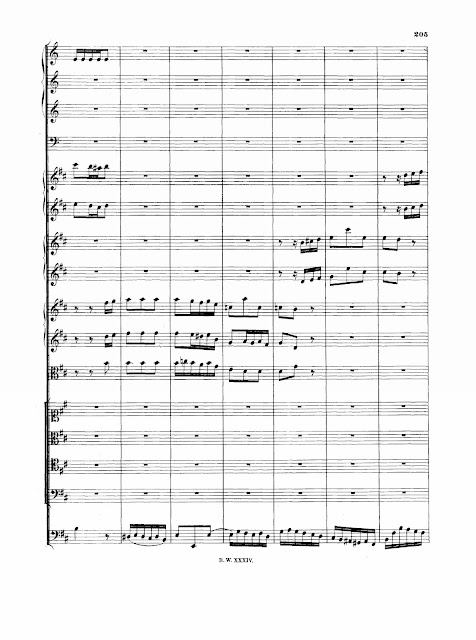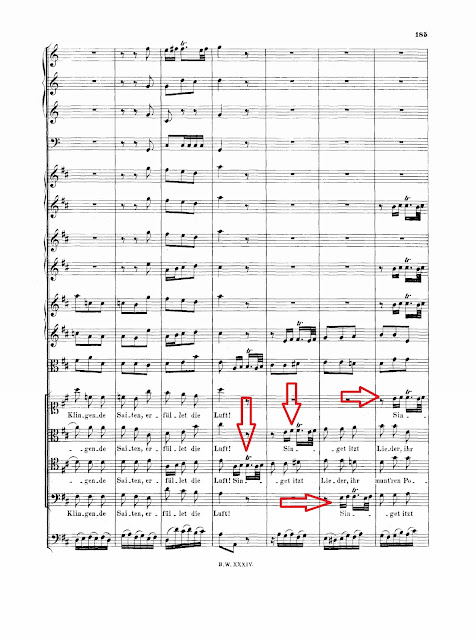CCCLIV. BACH, J.S. (1685-1750)
Bach composed this secular cantata for the 34th birthday of Maria Josepha of Austria (Queen of Poland by marriage to Augustus III).
Bach reused much of the music from this cantata for the Christmas Oratorio (see Post CLXIII).
The vocalists play gods and goddesses, all singing praises to the Queen.
Soprano (Bellona)
Alto (Pallas)
Tenore (Irene)
Basso (Fama)
First Movement
The drum sounds, the trumpets ring out (see text below):
The chorus enters and in unison imitates the timpani and trumpets:
This wonderful trilling figure occurs in canon at several different points on the word singet (sing):
And what a beautiful instrumental section with just strings, oboes, then flutes before the chorus re-enters:
Sound, ye drums! Ring out, trumpets!
Resonant strings, fill the air!
Sing songs now, y glad poets;
"Long live the Queen!" is joyfully cried.
"Long live the Queen!" is the Saxons' wish,
May the Queen live and bloom and thrive!
Second Movement
The tenor (Irene, goddess of peace) sings of such until the last line, where the continuo thunders the word imagery:
Today is the day
When everyone may rejoice.
This is the happy lustre
Of the hours of the Queen's birthday feast
That has found the Poles, Saxons and us
In the greatest pleasure and good fortune.
My olive-tree obtains
As much sap as there is rich space.
As yet it shows no faded leaves;
No storm, lightning, dark clouds or gloomy weather alarm me.
Third Movement
Per the text, the soprano (Bellona, goddess of war) is accompanied only by two flutes and continuo. Bach paints several different words with melismas ...
Blow the well-played flutes
So that foe, lilies and moon blush;
Sound with exultant song!
Ring out with your clash of weapons!
This festival demands joys
That nourish both spirit and mind.
Fourth Movement
Bellona continues the war metaphors in her recitative:
My exploding metal
Quivering in the air from cannon,
The glad din,
The pleasing sight,
The delight Saxony now feels;
Stirs many men's minds.
My gleaming weapon,
Along with my sons' steady strides
And their heroic actions,
Even more increases
Today's sweet joy.
Fifth Movement
And now we hear from Pallas (goddess of arts and sciences) in a virtuoso aria, accompanied only by two oboes.
Gentle Muses, my colleagues,
Do not sing songs long familiar!
Let this day be your pleasure!
Fill your breast with joy!
Throw down quill and script
And thrice delight again!
Sixth Movement
Pallas pays further tribute to the Queen:
Our Queen in the land,
Whom heaven sent to us,
Is the Muses' comfort and protection.
My Pierides, who in reverence
Still kiss her garment's hem,
Know how to raise thanks and duty and voice
Constantly for her continual prosperity.
Yes, they wish that her life
May long afford us delight.
Seventh Movement
The bass (Fama) finally gets his turn in this da capo aria. He sings about her fame (naturally) and virtue -- accompanied by the royal trumpet ...
Crown and prize of crowned ladies,
Of the world with your name.
May what is ever pleasing to virtue
And what only heroines possess
Be innate gifts for you.
Eighth Movement

Then let my voice, full of the Queen,
Penetrate into the earth's wide orb!
Her fame shall grow to the axis
Of beauteously star-decked heaven;
May the Queen of Saxony and Poland
Always be commended to heaven's protection.
Thus, through her, the pole of so many subjects'
Long-desired welfare will be strengthened.
Thus shall the Queen still tarry long with us
And may it be long before she hastens to the stars.
Ninth Movement
In a dance-like atmosphere, imagery of blossoming trees, weapons and chariots and joy all combine to wish the Queen a long life!
Blossom, ye lindens and cedars of Saxony!
Resound with weapons and chariots and wheels!
Sing with full voice, ye Muses!
Joyful hours, ye happy times,
Grand us golden joys still more often!
Live, Queen! Yes, live for long yet!



















No comments:
Post a Comment